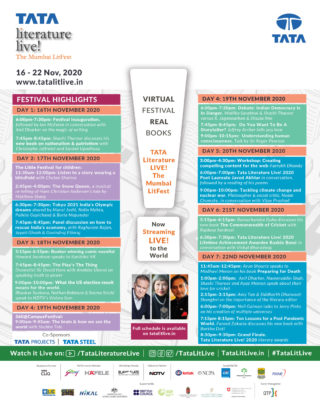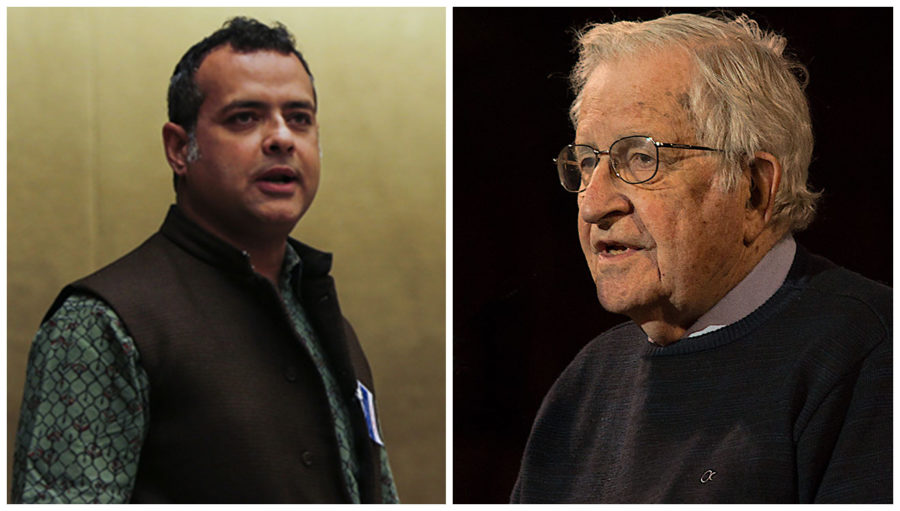Political activist Noam Chomsky and journalist Vijay Prashad have questioned whether the abrupt cancellation of their session at the ongoing Tata Literature Live, The Mumbai LitFest, amounted to censorship. The duo were to speak on the dangers of nuclear war, climate catastrophe, and the erosion of democracy, and were expected to be critical of corporations like the Tatas. Tata LitLive Founder and Festival Director Anil Dharker subsequently responded by saying that there was no room for “agenda” at the event.
The session, titled ‘On the Edge of a Precipice – Tackling Climate Change and Nuclear War’ was about Chomsky’s new book, Internationalism or Extinction. The discussion was scheduled for Friday, 20 November at 9 pm IST.
However, the session was cancelled abruptly, on the day of the event, prompting Chomsky and Prasad to issue their statement. Dharker, in his defence of the decision, said the “expression of such an agenda – whether against a specific organisation, a corporation or an individual – is…misplaced in the discussions at our festival”.

Both Chomsky and Prashad had been invited to participate in the event in September 2020. The two had also confirmed their participation with the organisers of the literary festival on Friday morning, according to their statement.
“Out of nowhere, near 1 pm Indian Standard Time, we received an email which said, cryptically, ‘I am sorry to inform you that due to unforeseen circumstances, we have to cancel your talk today’. Further inquires informed us to be in touch with the festival’s director, Anil Dharker. No communication has been established thus far with Mr. Dharker,” the statement read.
Interestingly, just hours before this session between Chomsky and myself, @tatalitlive cancelled our appearance ‘due to unforeseen circumstances’. More on this to come. pic.twitter.com/Yomx2Jspcl
— Vijay Prashad (@vijayprashad) November 20, 2020
“Since we do not know why Tata and Mr. Dharker decided to cancel our session, we can only speculate and ask simply: was this a question of censorship?” Chomsky and Prashad asked in their statement.
Context
A day prior to the program, several activists, artists, and academicians had sent a letter to Chomsky urging him to boycott the festival because the Tata Group was its title sponsor. The corporation, the letter alleged, “has had a long history of forceful displacement, human rights violations and environmental plunder”.
While Chomsky and Prashad declined to boycott the program, they said that they would start their event with a statement putting into context their thoughts about corporations such as the Tatas.
The two had planned to then continue their talk about “issues that threaten the planet, but then also talk about the specific role of countries such as India and corporations such as the Tatas.” Chomsky’s book focuses on the dangers of climate catastrophe and the threats of unprecedented corporate global power.
“We wanted to talk about how governments, such as those led by the Bharatiya Janata Party and corporations such as the Tatas, are hastening humanity towards a deeper and deeper crisis,” Chomsky and Prashad said.
“Regarding the Tatas, we wanted to put on record a few facts that should lead sensitive people to understand what the Tata company has underneath its fingernails: a role in the killing of adivasis who were peacefully protesting the construction of a Tata steel factory in Kalinga Nagar, Odisha in 2006; the use of private militias to terrorize the population for a planned Tata steel factory in Jagdalpur, Chattisgarh, about ten years ago; the use of Tata Advanced Systems weapons by the Indian forces against the people of Kashmir; and Tata steel’s release of hexavalent chromium into water sources has created the fourth most polluted place on the planet in Sukinda, Odisha. These are just a few examples of the atrocious way in which the Tata corporation has brought levels of extinction to the peoples of the planet,” the statement read.
A platform for open discussion
Chomsky and Prashad ended their statement by saying they did not boycott the LitLive fest and wanted instead to speak at the event “in the spirit of open discussion” and to hold a dialogue about “extinction and internationalism”. However, due to the cancellation, they said, “We will shortly announce a venue and a date for our dialogue on the pressing issues of our time.”
Following the cancellation, Roshan Ali, author of Ib’s Endless Search for Satisfaction, expressed solidarity with Chomsky and Prashad on Twitter, saying that he would also not participate in the Lit Live fest.
LitFest Director’s response
Dharker’s statement reads, “I do not wish to comment on their reasons for accepting an invitation to participate in an event and using the platform to air adverse views about the main sponsor. What I do want to state as strongly as possible is that the festival which I founded and run with a dedicated team owes its success to a free expression of ideas, not a free expression of someone’s specific agenda.”
Recommended
He also states that on the morning of the Chomsky-Prashad session, the team of LitLive fest came across “correspondence in the public domain, between Noam Chomsky, Vijay Prashad and a group of activists, which clearly mentioned that this session would also be used to make a statement regarding how they feel about corporations such as the Tatas, and the Tatas in particular, including airing the views of these activists.” This was not the intended purpose of the session, he wrote.
Social Media reactions
Responding to Dharker’s statement, comedian Aditi Mittal wrote, “To say your festival is about “free expression of ideas” and then consider someone’s “free” “expression” “of ideas” an “agenda” in the same paragraph is just disingenuous.”
Nilanjana Roy, a journalist, and author of The Wildings said, “I miss Girish Karnad. He knew how to speak his mind at a literary festival; that time when he spoke for the many who disagreed with Tata Lit Live’s decision to honour Naipaul.”



